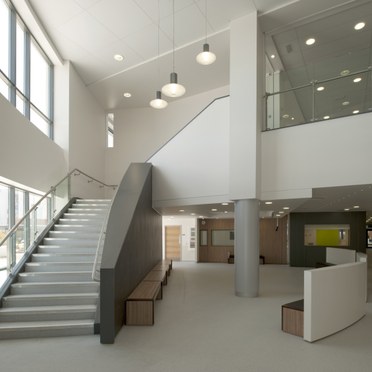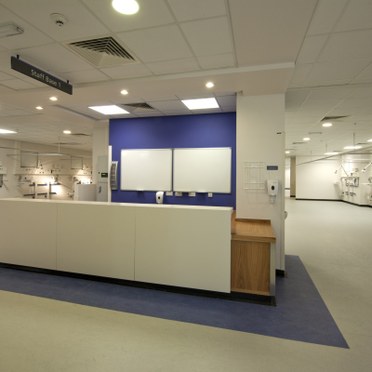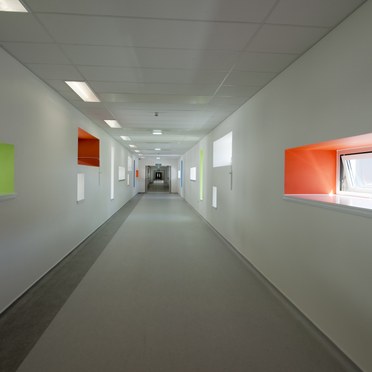Forth Valley Royal Hospital, Larbert, Scotland
- Lamp efficacy
Lamp efficacy
Ensuring the lamp efficiently converts electricity into light (lm/W).
- Ballast classification
Ballast classification
Controlling the electricity supply to the lamp (Energy Efficiency Index).
- Luminaire distribution
Luminaire distribution
Controlling light emission using optics which bend and shape the light to the correct location.
- System efficacy
System efficacy
Combining optical and thermal control within the luminaire (luminaire lm/W).
- Presence/absence detection
Presence/absence detection
Presence: Lights automatically turn on/off with movement. Absence: Lights automatically turn off and must be manually switched on.
- Daylight detection
Daylight detection
Artificial lighting which responds to the natural light conditions.
- Constant illuminance
Constant illuminance
A function designed to produce correct light levels for the duration of the maintenance period.
- Task-scene setting
Task-scene setting
Allowing the user to set scenes and adapt the lighting to different tasks.
- Timed off
Timed off
Automatic cut-off can be installed to turn all lights off during unoccupied hours.
- Task lighting
Task lighting
Lighting task areas with the correct amount of light.
- Zoning of lighting
Zoning of lighting
Lighting is zoned according to area use.
- Maintenance schedule
Maintenance schedule
Maintenance must be performed in response to product age, performance and environment.
- Waste light
Waste light
Eliminating waste light which does not hit the intended target.
- Reflectance
Reflectance
Taking advantage of light which is reflected from the surface within the space.
- Visible smart metering
Visible smart metering
Results of actions can be quickly seen as increased or decreased energy use to encourage responsible energy consumption.
Thorn supply new Scottish hospital
The new £300m Forth Valley Royal Hospital in Larbert, is Scotland's largest NHS construction project with 4,000 rooms and 16 theatres, and is lit by over 15,000 Thorn fluorescent luminaires.
The scheme called for Thorn's expertise because, unlike most interiors, a healthcare environment calls for equipment capable of withstanding stringent hygiene requirements and lighting specific tasks. For example, sealed Invincible fittings have been installed in the operating theatres and recessed single lamp asymmetric luminaires with solid optics illuminate the corridors, but not recumbent patients.
Using "corridorFUNCTION" electronic dimmable ballasts, the luminaires gradually dim to a lower light level if no movement is detected by the motion sensors, thus saving energy. As soon as someone enters the space the light is returned to its full level. The use of lighting controls also provides night-lighting, eliminating the need for auxiliary lamps.
Energy conscious Cruz 205 downlights (32W TC-TEL-I), including sealed IP54 versions, and recessed modular IndiQuattro fluorescents provide the primary light source in the circulation areas, restaurant, toilets, lecture theatre and meeting rooms. Lamp replacements in an installation such as this can be a costly and time consuming exercise and the decision to minimise the number of different types and wattages reduces complexity in installation and aids future replacement.
As a result of the specialist nature of the project, there was close liaison between Thorn's sales and development staff and the Laing O'Rourke (design and construct) consortium, incorporating Crown House Technologies as electrical constructor, and DSSR as consulting engineers. Thorn provided technical support in the form of 3D design renders, samples, plus "quick-fix" solutions ranging from 'plug and play' wiring to the 'sec-lock' holding arm, which retains the downlights – problem-free – in place.
The Project, won by Forth Health (a joint venture between John Laing and the Commonwealth Bank of Australia) and their partners Laing O'Rourke (design and construct) and Serco (hard and soft FM), was procured under the Government's PPP Initiative.



